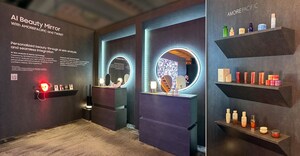
SEOUL, South Korea, April 27, 2020 /PRNewswire/ -- Amorepacific R&D Center has developed a 'porous, micro inorganic material platform technology', which is a white-cast-free solution that reflects UV rays effectively. Related research accomplishments that will become a cradle for innovative inorganic sunscreens have also been published online in the March issue of Particle & Particle Systems Characterization, a reputable journal, and selected to grace the cover of its April issue. (Title: Transparent and UV‐Reflective Photonic Films and Supraballs Composed of Hollow Silica Nanospheres)
Skin aging is known to be induced largely by light. In response, there is an active development going on in the industry to create sunscreen cosmetics aimed at protecting skin by either reflecting or absorbing light that falls within the UV spectrum, the cause of dermal damage. Zinc oxide (ZnO) and titanium dioxide (TiO2) are widely used as inorganic materials to reflect UV rays. There are, however, drawbacks as these substances cause white cast when applied in their original form due to their high refractive index. They also lead to clumps forming in the formula.
In an effort to develop some type of breakthrough for these demerits, Dr. Li Yan from Amorepacific R&D Center Material Lab partnered up with Professor Lee Gi-ra and his lab in Sungkyunkwan University Chemical Engineering to conduct a joint research project. Through this study, the team were able to evenly synthesize and assemble micro-sized spherical silica particles that are hollow in the middle. The film produced from these particles can be adjusted to have even air bubble sizes and gaps in between, to be able to reflect visible light and UV spectrum rays. The team also discovered that by matching the refractive index, they were able to more effectively reflect UV rays while still appearing transparent in the visible spectrum. This is similar to the natural mechanism of chameleons or green algae that quickly change their skin color by scattering light.
Park Won-seok, Head of Amorepacific R&D Center Foundation Innovation Lab expressed, "The recent research results we have announced are very meaningful as we came to possess a platform technology to develop innovative inorganic materials. We will continue to verify the potential of this platform through clinical trials on skin." He added, "Amorepacific R&D Center will continue with its best efforts to provide health and beauty for the customers around the world based on our ceaseless fundamental research."
Since the 1959 release of ABC Parasol Cream, Korea's first sunscreen, Amorepacific R&D Center has been dedicated to developing innovative organic/inorganic sunscreen materials, powered by its research capacity in basic science. Their steady dedication to developing creative materials led to the 2003 release of HERA Sun Mate Cream, which incorporated the technology of the nano compound of organic and inorganic ingredients, and the 2019 launch of IOPE UV Shield Sun Anti-Pollution and LANEIGE White Dew Tone-up Fluid, which involved materials that stabilize poorly water-soluble organic sunscreen agents.
About Amorepacific
Since 1945, Amorepacific has had a single, clear mission: to present its unique perception of beauty– namely what it calls 'Asian Beauty' – to the world. As Korea's leading beauty company, Amorepacific draws from its deep understanding of both nature and humanity to pursue harmony between inner and outer beauty. With its portfolio of over 20 cosmetics, personal care, and health care brands, Amorepacific is devoted to meeting the various lifestyles and needs of global consumers around the world. The company's research hubs located around the world are dedicated to sustainable R&D that combine the best of natural Asian ingredients and advanced bio-technology. With its world-class products, Amorepacific is acclaimed for the innovative ways in which it is transforming global beauty trends.
SOURCE Amorepacific






Share this article